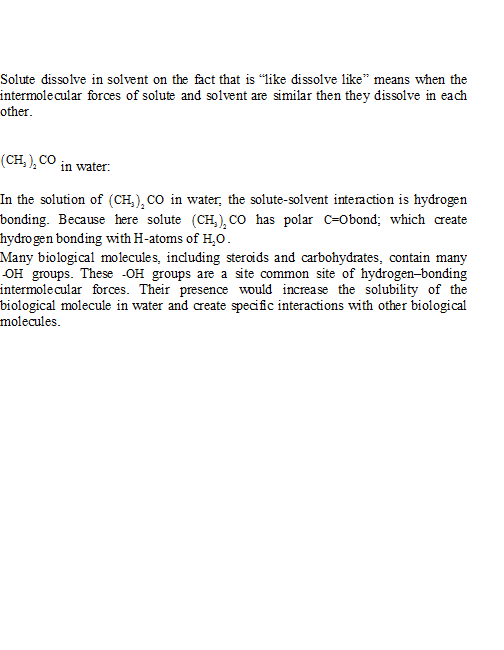Question
In: Chemistry
Hydrogen bonding increases the intermolecular forces of attraction and hence increased hydrogen bonding increases the solubility...
Hydrogen bonding increases the intermolecular forces of attraction and hence increased hydrogen bonding increases the solubility in a liquid. For example, Methyl alcohol which is organic in nature is miscible with water due to hydrogen bonding. For the same reason acetic acid is soluble in water due to hydrogen bonding. Acetic acid (CH3COOH) has got only one carbon atom and steric hindrance of the methy group is low which permits water (solvent) to get attached to solute. Can you elaborate more on hydrogen bonding as it relates to disolving a solute in a liquid? Please use more than 150 words.
Solutions
Expert Solution
Intermolecular forces:
Intermolecular forces are the forces that act between one molecule to other molecules as attraction. These are mainly three types:
- Dipole-dipole interaction
- Hydrogen bond
- London dispersion force.
London dispersion force:
- London dispersion force is an intermolecular force which occurs between an atoms or molecules which are polar or non-polar and another atom or molecule which are polar or non-polar.
- It occurs between all molecules or atom.
- London dispersion forces are the result of temporary dipoles in the atoms or molecules.
Dipole-dipole interaction:
- This type of interaction forces is found between polar molecules.
- The strength of this force is increasing with increasing polarity of molecules.
Hydrogen bond:
- Generally hydrogen bond is found in those molecules which have covalently hydrogen atom bonded with high electronegative atoms like oxygen, nitrogen and fluorine.
Hydrogen bond found in polar molecules containing unpaired electrons along with a hydrogen atom bonded with oxygen, nitrogen or fluorine atom
Solubility of substance depends on the following three relatives’ strengths:
- Solute –solute
- Solvent-solvent
- Solute –solvent

Related Solutions
How do intermolecular forces of attraction originate ?
Which type of intermolecular forces (hydrogen bonding, dipole-dipole forces, London dispersion forces) would occur for each...
Which type of intermolecular forces (hydrogen bonding, dipole-dipole forces, London dispersion forces) would occur for each...
Classify each substance based on the intermolecular forces present in that substance. Hydrogen bonding, dipole–dipole, and...
Classify each substance based on the intermolecular forces present in that substance. Hydrogen bonding, dipole–dipole, and...
Classify each substance based on the intermolecular forces present in that substance. Hydrogen bonding, dipole–dipole, and...
Intermolecular forces * Relate properties of substances to the predicted Intermolecular bonding of the substances
For each of the following substances, state whether the intermolecular forces are primarily hydrogen bonding, permanent dipole, or temporary dipole.
What are cohesive forces? The intermolecular attraction forces that make molecules of one substance repel each...
How is the bonding of intermolecular forces of an organic compound like butanol similar to that...
- 1. The activation energy of a certain reaction is 41.5kJ/mol . At 20 ?C , the...
- Give TWO pieces of evidence that you've successfully made methyl salicylate. Remember when you cite TLC...
- Describe briefly the evolution of Craniata and Vertebrata.
- How many grams are in a 0.10 mol sample of ethyl alcohol?
- For this assignment you will write a program with multiple functions that will generate and save...
- How many grays is this?Part A A dose of 4.7 Sv of γ rays in a...
- how to operate a business?

 queen_honey_blossom answered 3 years ago
queen_honey_blossom answered 3 years ago